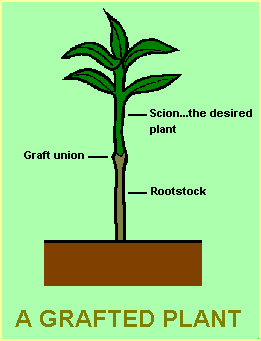|
[Front Page] [Features] [Departments] [SGAP Home Page] [Subscribe]

The Nurseryperson and You
Barry Hill
I have decided to focus this article on two aspects. Firstly an overview of what is happening in the nursery industry. Many of these points relate to the general industry and not specifically to the sale of native plants. And secondly, as a customer and what you should expect from your nursery.
Trends in the Trade
There are changing trends in the nursery industry. Sales of "trees and shrubs" have fallen by over 50% in the last 10 years. Some other directions have been noticed. At Facey's Nursery in Melbourne, for example, owner Rex Trimble market has remarked that changes have been considerable over the past 15 years. The market for Australian Natives has dropped dramatically, with stock levels changing from 65% natives and 35% exotic to today's figure of 70% exotic and 30% native.
Further to the issue of changing customer preferences comes "Potted Colour". This segment of the market which includes bedding plants, potted plants and flower seed, in 1990 captured $75,000,000 of the market. Customers derive instant satisfaction from potted colour more so than any other nursery item. It's a fashion market with a trend from young people for the "instant flowering garden" There are environmental considerations from potted colour compared with trees and shrubs. ie throw away plastic containers, fertilisers, chemicals and potting medium for a short term product.
Which leads me to the comments made by many of my customers, "It must be great to work with plants all day in the outdoors!" Well lets consider the risks to skin cancer, the exposure to chemicals and carcinogens, fertilisers leaching into the water table, consumption of plastics, destruction of peat bogs. It's almost enough to drive you back to an office job. I can only hope the positive side outweighs the negative.
Changes have also occurred in people's life style and in the size of the average backyard, if you are lucky
enough to have one. There is a tendency towards smaller compact gardens, courtyards and small outdoor areas. There is also an influence of cottage style gardens with bedding plants. Although the natives are fighting back in this area with some of the paper daisies and Isotoma species being trialed to assess their suitability as bedding plants.
 |
Colourful hybrid paper daisies are becoming popular for spectacular garden colour.
Select the thumbnail image or plant name for a higher resolution image (50k).
|
Customers' buying trends are also influenced by the new promotional lines. New PBR (Plant Breeders' Rights) releases that are backed by substantial marketing budgets are certainly capturing their share of the market. The PBR of course, restricts the propagation to only those nurseries licensed to grow the plant.
Surviving Beyond the Next Sale
Competition for maintaining sales comes from many directions for the nursery person. We have the supermarket chains selling plants at prices sometimes less than accepted wholesale prices, Sunday markets, often used by the wholesalers to off-load excess stock, Government nurseries using my taxes to sell subsidised stock, grants to Landcare groups to set up nursery production, government subsidies via unemployment programs to establish new business opportunities in the nursery trade without proper market research etc.
In recent times the financial downturn in many small businesses has been blamed on the introduction of "pokies". This may or may not be true but recent figures released by the Victorian Government indicate a 50% increase in gaming, to 8 billion dollars. It would be reasonable deduction to conclude this has put a lot of demand on people's expendable income.
Country nurseries are particularly disadvantaged as they are often small and have a finite customer base, face extra freight costs, as they are usually quite a distance from suppliers. They may also have a slower turnover which can result in deteriorating stock.
|
| "It costs five times more to gain one new customer than it does to keep an existing one." |
|
So how is the small nursery going to survive against the big guys and all the other threats? Well, here is a few suggestions: clearly define to your customers what you stand for- honesty, good service, reliability. Decide what your business is about - develop a niche. Don't try to be all things to all people! Every contact you have with a customer is message about your business and service. Make sure it's a good one!
It costs five times more to gain one new customer than it does to keep an existing one. There are figures taken out a few years ago that suggested that when you start a new business you can expect to loose some 68% of your original customers as a result of perceived indifference or disourteous service! This is one area you have control over. Only 9% of those customers will be lured away by price, so stop worrying about price competition and get on with providing good service.
The "added value lines" which can be sold in conjunction with green life are important to the financial survival of the retail nursery trade and trends would indicate the inclusion of an increasing array of accessories and hardware on offer at the larger nurseries. Competition comes from retail hardware chain stores which are now taking on the sale of plants and accessories.
Gardening Gurus
It has been stated that gardening receives more media exposure than sport over the year. Programs like Burke's Backyard, love him or hate him, do stimulate gardeners into action. Whenever he highlights a plant on his show, you can bet the nurseries will be full of people looking for it soon after. Sometimes a plant species may come in for some criticism which may be relevant for the district in question, but that plant my perform very well elsewhere. I recall one instance recently when Hakea salicifolia was castigated for failing in the Sydney region, but my experiences with the same plant in southern Victoria has been very good. Such generalisation should be avoided. I often hear on talk back gardening shows questions directed to the gardening experts relating to native species, which are either not answered correctly or not to the caller's satisfaction. Good advice delivered in a professional manner is important to encourage less knowledgeable gardeners with their pursuits and to have positive results in their gardens.
Training
Tomorrow's nurseries must be staffed by honest, passionate caring people. They must be retailers of quality plants at realistic prices, and staffed by trained personnel who can always be relied upon to give totally professional advice and service. Many overseas countries require formal training in horticulture as a prerequisite to starting a nursery. I can see many advantages in this approach both for the customer and owner. Many people have accepted financial packages in recent times as many government departments and private sector companies downsize their staff levels. Some see buying a nursery as an easy way to spend the latter part of their working life. Many are naive and face disappointment. I have seen new owners last only a matter of months before selling out.
Owning and managing a nursery is a dedicated profession requiring great skill in plant production, merchandising, customer relations, financial management and a very tolerant partner. The rewards may be very satisfying, but the financial returns are limited. It's best described as a way of life than a path to a financial bonanza.
The Customer's Viewpoint - AHC Survey
The Australian Horticultural Commission conducted a survey of Real Estate agents throughout Australia and it was revealed that a well maintained landscaped garden can add up to 10% on the average house value. In Melbourne 66% of prospective buyers thought it important that a property had an attractive garden. Traditionally, Australia's have had a very strong affinity with gardening and part of my bent in life is to encourage people to plant native plants and help develop an awareness of native birds and other fauna in the context of a garden. Customers come is all shapes and sizes and with different requirements.
We have COLLECTORS - just got to have this or that, even if they have already killed a truck load.
INDIGENOUS GREENIES - have you collected the seed locally? Do you have it in a tube?
The WELL SEASONED GARDENER who understands their own needs and will accept good advice and suggestions when given.
The NOVICE GARDENER who can be the most difficult because they are restricted by their own lack of knowledge and until they accept your sincere assistance remain indecisive.
Another important observable difference is between country and city customers. Country people tend to be much more trusting and open, and with a limited customer base in the country, developing customer loyalty is important. Unlike their city cousins, who are much more suspicious of salespeople of any sort! They need to be given much more space to consider their purchase without undue perceived interference.
 
Customers should be aware of some of the changes that have taken place in the more progressive nurseries. Root pruning is now standard procedure when transplanting seedlings with long roots. Direct seeding is gaining greater popularity because of its ability to produce a plant with superior root system. Root trainers are now built into plastic pots and tubes and they really do work well. Many of our harder to grow species can now be obtained on grafted root stock which makes these sometimes temperamental species much more reliable. Growers are aware of the need to be much more selective when growing "forms" of native plants, choosing plants with better flowering colour and form etc. These selections are made on ornamental criteria and do not ignore the need to use local forms of species when dealing with environmental or habitat planting.
Recent media discussion relating to the proposed introduction of Pest Plant Bylaws in the former Shire of
Eltham threw the Nurserymen's Association of Victoria and local garden clubs into a frenzy. We will all watch this debate with great interest. Will Nurserymen be asked to lead the campaign against environmental weeds? Geoff Carr has listed some 584 potential environmental weeds in Victoria from Eucalyptus leucoxylon "Rosea" to silverbeet. What may be a native plant enthusiast's pride and joy on one side of the fence may be a rampant horror on the other side. Whilst such bylaws are commendable, they will be difficult to enforce both in a physical and financial way. Nurseries can play a vital role in the education of the buying public with help from other community groups such as SGAP.
 |
Eucalyptus leucoxylon "Rosea" - beautiful flowering gum but an environmental weed in some areas?
Select the thumbnail image or plant name for a higher resolution image (31k).
|
I believe in the future it will become common place for retail nurseries to provide a replacement guarantee with most plants purchased. Some nurseries are already providing this service in Melbourne. Most plants are killed by a lack of understanding on the part of the customer, so it is up to the nursery to provide the right information or the right plant for the customers needs.
The pictorial label has become a very important part of marketing plants. The information provided on labels has improved over the years but still carry incorrect or outdated names. Information given is often very general even though the plant being described may have very specific requirements.
Kuranga Nursery (Ringwood, Melbourne) has employed a system of placing an additional printed label "I'm a Fuss Pot" in species that require special attention. This alerts the customer to the challenge that maybe ahead if purchasing this plant. An excellent example of helping the customer make the right decision.
As a wholesaler, I have had to drop many species from my propagation list because no pictorial label was available. Retail nurseries are reluctant to purchase stock not carrying a pictorial label unless the plant is in flower or has some other redeeming feature.
A lack of knowledge and enthusiasm about natives often greets the customer at a general nursery which may only carry a very limited and often sad range of native plants. So it's a pleasure to visit a speciality nursery such as Kuranga where a vibrant "display only" range of flowering plants await the customer and then entices you to venture forth and discover more.
The Rural Scene
There has been a strong move towards planting indigenous species over the past few years. This has been encouraged by political motivation via the "One Billion Tree" program, Greening Australia and other government agencies, as well as SGAP and other like-minded groups.
|
| "......we still do not understand the "big picture", the relationship between insects, birds, fungi, soils and plants." |
|
This is an encouraging step forward but we still do not understand the "big picture", the relationship between insects, birds, fungi, soils and plants. We will need to fine tune our efforts if we expect to achieve a balance somewhere near that of nature. Many farmers will give the :"local" species a go but their bottom line is performance of the planting. Many Landcare groups receive funding for tree planting but there needs to be stronger assurances given that only indigenous species be planted with such grants. At the moment some plantings are made up of a blend of indigenous and exotic natives.
Many challenges lay ahead in discovering the skills required to propagate some of our indigenous species. This is one area of interest to me and other nurseries in the area as we strive to provide our customers with an increased range of local species for revegetation projects.
I have derived much pleasure over the years from propagating and gardening with native plants and sharing knowledge with other like minded people. It's a fascinating area of interest which will continue to convert newcomers to our Society.
This article is a reproduction of a paper presented at the SGAP 18th Biennial Seminar, Ballarat, Victoria, 23 - 29 September 1995.
Barry Hill is the proprietor of Tree-Action Wholesale Nursery, Leongatha South, Victoria which is part of the Indigenous Nursery Network. Barry, and his family have actively pursued conservation issues through involvement with the South Gippsland Conservation Society. He has served on several committees relating to indigenous seed banks, roadside management, sustainable agriculture and wetland management, and is actively involved in a number of landcare projects.

[Front Page] [Features] [Departments] [SGAP Home Page] [Subscribe]
Australian Plants online - December 1998
The Society for Growing Australian Plants
|